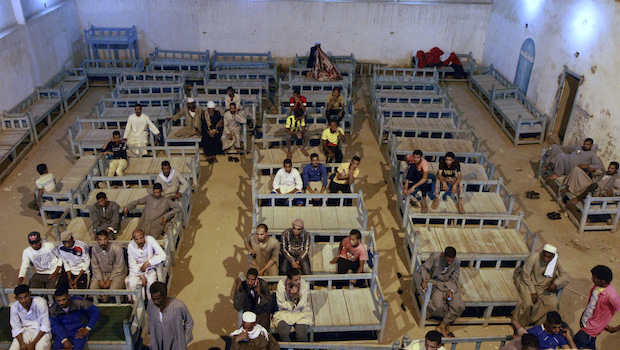
Arab family members gather in a communal family space to discuss plans after a truce expires following tribal feuding in Aswan, Egypt, on April 9, 2014. (AP Photo/Sabry Khaled, El Shorouk Newspaper)
Egypt is a country with many faces and a country that continually finds itself at the center of attention. One facet of Egypt’s complex culture that has only recently drawn international interest is al-tar—the vendetta. Although blood feuds have long been a defining feature of Upper Egypt, the custom made headlines earlier this month when at least twenty-four people died in Aswan over a period of two days in a series of revenge killings between Nubian villagers from Daboud and members of the Arab clan of Beni Helal.
For an Egyptian, the word al-tar evokes a rich and somewhat otherworldly history of black and white television, old stories of turbaned and mustachioed clan leaders resting their kartoush shotguns across their knees and ordering attacks on rival families while puffing on shisha and drinking Turkish coffee. For those living in Aswan and elsewhere in Upper Egypt, these blood feuds remain an all-too-near reality; the only difference is that the ancient shotguns have been replaced by AK-47 assault rifles. In the Arabic language, where any one word can mean a host of different things, al-tar has only one meaning. This entire culture of vendetta, going back hundreds of years, can perhaps best be summed up in the oft-quoted proverb al-tar wala al-aar: “Revenge or disgrace.”
Vendettas in Upper Egypt break out over the reasons most people might expect: land, property and perceived slights on honor. In a region suffering from a weak police presence, the proliferation of arms and a culture where the code of silence is still practiced, al-tar servers as an important, if somewhat crude, societal safety valve. But the most recent deadly conflict, between the Arab Haleyla clan and Nubian Daboudiya tribe this month, differed from most traditional examples of the phenomenon, seemingly centering on three of the great blights of modern Egyptian society: sexual harassment, political division and ethnic tension.
The unrest in Aswan apparently broke out over the harassment of a girl from one of the tribes, starting a brawl at a local school. Clashes continued for the next 48 hours with casualties on both sides before the authorities intervened, securing a fragile truce. The underlying political and ethnic tensions can be seen in graffiti scrawled on the burned-out walls of houses, with the Nubians accusing the Arabs of being faloul, backers of the now-discredited regimes of Hosni Mubarak and Mohamed Mursi. The Arab side reportedly castigates the Nubians for their recent meeting with president-in-waiting Abdel-Fattah El-Sisi while extolling Arab dominance in the region.
Egypt’s Nubian community, marginalized under both Mubarak and Mursi, are hoping for a brighter future under Sisi’s presidency. But at a time when politics in Egypt appears to be taking a more confrontational approach, it is only reasonable to assume that ethnic and religious hostility will continue, if not worsen.
Even the manner in which this unrest was resolved betrayed some of the worst aspects of Egypt today, including a preoccupation with conspiracy theories and a disinclination to deal with reality objectively. Following the truce, a joint statement issued by the two sides accused “invisible hands” of igniting the feud, while Egyptian military spokesman Ahmed Mohammed Ali blamed the Muslim Brotherhood.
The unrest in Aswan may have cooled, thanks to political and security deployments and the intervention of Al-Azhar, Egypt’s top Islamic institution. But with so many dead, and honor on each side demanding retribution, one cannot expect this to last for long: In Egypt, al-tar is a dish that can be served cold or hot.
This article was originally published in The Majalla.
